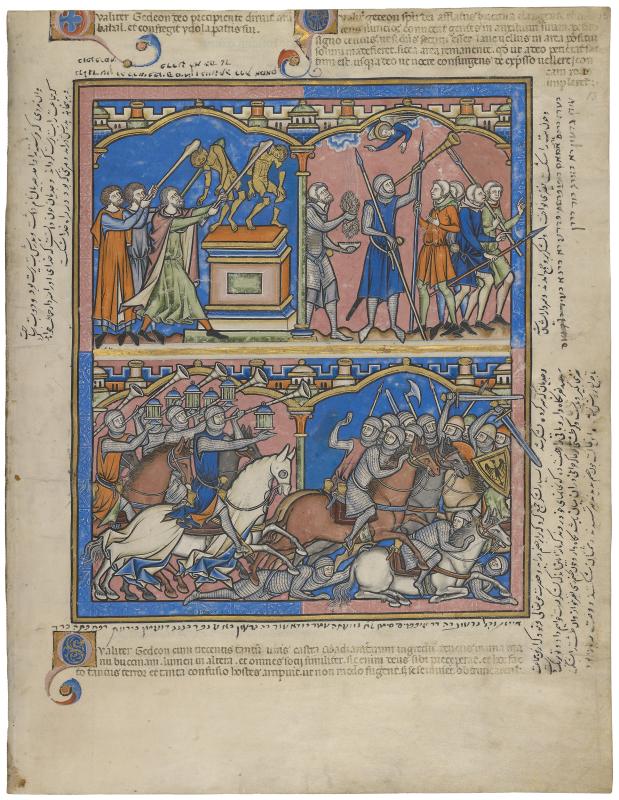
Baal's Altar Destroyed, The Sign of the Fleece, Gideon's Valiant Three Hundred
Old Testament Miniatures with Latin, Persian, and Judeo-Persian inscriptions
Purchased by J.P. Morgan (1867–1943) in 1916
Folio 13r (Latin)
Upper left: How Gideon tore down the altar of Baal and shattered his father’s carved images into pieces, as God had instructed him. (Judges 6: 25–32)
Upper right: How Gideon, now full of the spirit of God, sounded the trumpet, sent messengers, and called other people to come to his assistance. Then he asked as a sign from heaven, that if God was with him, only a fleece of wool that had been placed on the floor would be touched with dew, while the noor would remain dry. This happened as he had asked from God and he rose up after the night and filled a vessel with dew from the wrung fleece. (Judges 6: 34–38)
Lower half: How Gideon enters the Midianite camp with only three hundred men, carrying, as do his allies, a trumpet in one hand and a lamp in the other, for God had instructed him to do so, and thereupon such a great terror and confusion seized the enemies that they not only fled but cut each other down. (Judges 7: 16–23)
Folio 13r (Persian)
Upper left margin: And the man to whom the angel appeared was called Jidian (Gideon) and his father was an idolater and he fashioned two idols in order to convert the people to idolatry. And when Gideon found out that God will make him the commander of the people, he came to his father’s temple of idols and smashed all the idols, for the sake of God.
Upper right margin: And when he had smashed the idols, he blew a trumpet and the army gathered around him and he became their commander.
Lower right margin: And Gideon, having become the commander of the army, gathered a large army to compete with the army of the enemy. His Excellence God the Exalted ordered him to keep [only] three hundred of this group and release the rest to return to their homes [saying], "We will make you victorious with this small army; take a trumpet in one hand and hold an [empty] basin with a lamp inside in the other and when you reach the enemy, blow the trumpet and break the basin so that the lamp glows and when the enemy sees this event, they shall be frightened and the army shall break up and relief will come."
Folio 13r (Judeo-Persian)
Upper left, beneath Latin: The tale of Gideon when, as it is written in Judges [chapter] 6; he went before the idolatry of his father, and struck them [the idols] down.
Upper right margin, furthest right: After gathering together in front of the idolatry of his father, Gideon blew into a trumpet and they [the people] made him their chieftain.
Lower half, above Latin: This is the tale of Gideon, as it is written in Judges [chapter] 7; it was God’s command that Gideon should go to war against the enemy with three hundred men; having gone, he won.
Baal's Altar Destroyed
At night, Gideon and his companions arrive at the altar of Baal that was erected by Gideon's father. The men smash the idols of the false deity to pieces with clubs, in accordance with the Lord's wishes. In its place, a new altar will be consecrated to the Lord. (Judges 6:25–27)
The Sign of the Fleece
Again, Gideon asks the Lord for a sign to confirm that he shall deliver Israel. He leaves a wool fleece on the floor overnight. If in the morning there is dew on the fleece only, and the ground is dry, he will know that he has the Lord's favor. Indeed, come morning, the fleece alone is wet with dew, as Gideon requested. He wrings the dew from the fleece and collects it in a vessel. With a golden trumpet, Gideon calls messengers and charges them to assemble an army. (Judges 6:34–38)
Gideon's Valiant Three Hundred
Thousands arrive to follow Gideon, but the Lord, as a sign of his might, promises Gideon that only three hundred will be necessary to defeat Midian. Each man is given a trumpet and a lantern. At nightfall, the three hundred surround the enemy encampment, sound the trumpets, hold aloft the lanterns, and cry aloud: "The Sword of the Lord and of Gideon!" The terrifying spectacle causes chaos in the Midian camp; the Midianite soldiers flee the Israelite cavalry and confusedly strike each other down. (Judges 7:16–23)
